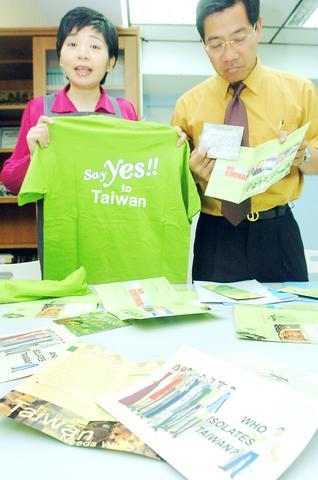The World Health Organization (WHO) has banned Taiwanese journalists from its annual summit in Geneva.
Authorities overseeing press accreditation for the World Health Assembly (WHA) confirmed yesterday that journalists holding Taiwanese passports would not be permitted to enter the assembly building.

PHOTO: GEORGE TSORNG, TAIPEI TIMES
According to the UN Department of Public Information, the office in charge of accreditation, this year's regulations state that Taiwanese passport holders will not be issued press passes as Taiwan is not a UN member state.
While the regulation is not new to the UN, it is a change to WHA accreditation procedures. In past years, accreditation had been processed by the WHO Media and Communications office and Taiwanese nationality was not a barrier.
"Basically, what's happened is that there has been an increase in security threats to the UN and UN personnel in the last week ? As a result, security of the UN has been increased and made much more strict," WHO spokesman Iain Simpson told the Taipei Times yesterday.
China's role in crafting the regulations was unclear.
Ministry of Foreign Affairs spokesman Richard Shih (
"All I can say right now is that we are trying to understand the situation," Shih added.
The policy change comes just days before the start of the health summit, which runs from Monday to May 22. While accreditation requirements previously posted on the WHO Web site had not listed a passport photocopy as a necessary item for accreditation, changes were listed online on Tuesday.
Department of Public Information officials insisted the passport regulations were long standing.
"This has always been the case here in Geneva ? these procedures have been around for more than 30 years and will stay like this for quite a while," said Katherine Segli, a department official in charge of journalist accreditation.
She attributed the issuing of press passes to Taiwanese journalists in the past to good fortune.
"You just had some luck in the past," Segli said.
The regulation does not simply bar non-UN members from entry, however.
A Department of Public Information official explained that countries not in the UN but with WHO observer status would be granted press passes. Palestine, the Holy See and the Sovereign Order of Malta have received invitations to participate as observers to the WHA.
"This is an old problem that we've run up against in the past," said Shen Lyu-shun (沈呂巡), director-general of the Taipei Cultural and Economic mission in Geneva.
"The same regulations have been implemented at the UN building in New York. We're currently negotiating with both the WHO and the UN," Shen said.
According to Shen, while Taiwanese journalists have been barred, a number of Taiwanese government representatives and members of non-governmental organizations will be allowed to listen in on assembly proceedings from the public gallery.
A domestic media organization commented on the issue yesterday.
"The association's stance is that you can't deny coverage of an event by saying that Taiwan is not a member state of the UN," said Tony Liu (
"This is a political move that is biased against Taiwan," Lu said.
Also See Story:
Editorial: WHO acts as China's accomplice

PREPAREDNESS: Given the difficulty of importing ammunition during wartime, the Ministry of National Defense said it would prioritize ‘coproduction’ partnerships A newly formed unit of the Marine Corps tasked with land-based security operations has recently replaced its aging, domestically produced rifles with more advanced, US-made M4A1 rifles, a source said yesterday. The unnamed source familiar with the matter said the First Security Battalion of the Marine Corps’ Air Defense and Base Guard Group has replaced its older T65K2 rifles, which have been in service since the late 1980s, with the newly received M4A1s. The source did not say exactly when the upgrade took place or how many M4A1s were issued to the battalion. The confirmation came after Chinese-language media reported

A Ministry of Foreign Affairs official yesterday said that a delegation that visited China for an APEC meeting did not receive any kind of treatment that downgraded Taiwan’s sovereignty. Department of International Organizations Director-General Jonathan Sun (孫儉元) said that he and a group of ministry officials visited Shenzhen, China, to attend the APEC Informal Senior Officials’ Meeting last month. The trip went “smoothly and safely” for all Taiwanese delegates, as the Chinese side arranged the trip in accordance with long-standing practices, Sun said at the ministry’s weekly briefing. The Taiwanese group did not encounter any political suppression, he said. Sun made the remarks when

The Taiwanese passport ranked 33rd in a global listing of passports by convenience this month, rising three places from last month’s ranking, but matching its position in January last year. The Henley Passport Index, an international ranking of passports by the number of designations its holder can travel to without a visa, showed that the Taiwan passport enables holders to travel to 139 countries and territories without a visa. Singapore’s passport was ranked the most powerful with visa-free access to 192 destinations out of 227, according to the index published on Tuesday by UK-based migration investment consultancy firm Henley and Partners. Japan’s and

BROAD AGREEMENT: The two are nearing a trade deal to reduce Taiwan’s tariff to 15% and a commitment for TSMC to build five more fabs, a ‘New York Times’ report said Taiwan and the US have reached a broad consensus on a trade deal, the Executive Yuan’s Office of Trade Negotiations said yesterday, after a report said that Washington is set to reduce Taiwan’s tariff rate to 15 percent. The New York Times on Monday reported that the two nations are nearing a trade deal to reduce Taiwan’s tariff rate to 15 percent and commit Taiwan Semiconductor Manufacturing Co (TSMC, 台積電) to building at least five more facilities in the US. “The agreement, which has been under negotiation for months, is being legally scrubbed and could be announced this month,” the paper said,